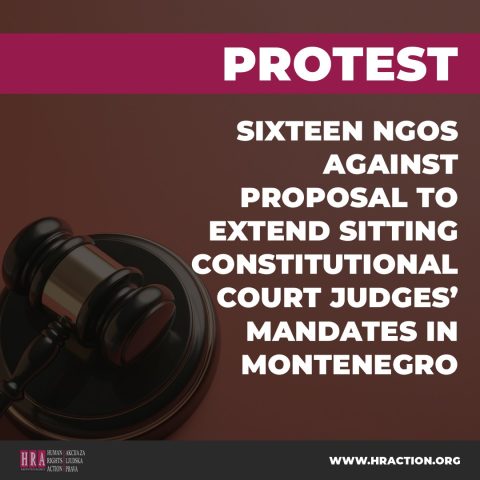
Report of the Special Rapporteur on the independence of judges and lawyers, Margaret Satterthwaite
12/04/2024
61 NGOs’ Initiative for Montenegro to Sponsor the UN Resolution on Genocide in Srebrenica
17/04/2024SIXTEEN NGOs PROTEST AGAINST PROPOSAL TO EXTEND SITTING CONSTITUTIONAL COURT JUDGES’ MANDATES IN MONTENEGRO

Members of The Europe Now! Movement (PES), Vasilije Čarapić and Darko Dragović, have proposed an amendment to the Law on Pension and Disability Insurance [1] to create an exception to retirement conditions in favour of judges of the Constitutional Court. Adoption of the proposal would extend the mandate of the current President of the Constitutional Court, Milorad Gogić and Judge Budimir Šćepanović, whose terms under the current law expire in May. Additionally, it would affect Judges Dragana Đuranović and Desanka Lopičić, whose functions are supposed to end by the end of this year.
Milorad Gogić and Desanka Lopičić have been judges of the Constitutional Court since 2005, Budimir Šćepanović since 2013, and Dragana Đuranović since February 2023.
The undersigned non-governmental organizations strongly oppose the proposed amendment to the law, considering it an inappropriate influence of the executive branch on the Constitutional Court. We believe that adopting the proposed legislative change and extending the mandates of current judges would unnecessarily jeopardize the integrity of the Constitutional Court, which must uphold the rule of law rather than the interests of the executive.
If the government’s true objective had been a principled consideration of the optimal retirement age, this issue would not solely concern Constitutional Court judges but all judges who are in the same legal situation due to the wording of the Constitution. It would not be hastily initiated by the deputies without public debate, an action evidently aimed at preventing imminent expiration of mandates for current Constitutional Court judges.
We believe that the issue of the termination of judicial functions should be opened and resolved on a principled basis for all, in a manner that does not compromise the integrity of the Constitutional Court.
Below are more detailed reasons against the proposal of the said MPs:
1) Hasty changes to the law aimed at extending the mandates of current Constitutional Court judges would only confirm suspicions of political influence on four judges of the court who meet retirement conditions this year under the existing Law on Pension and Disability Insurance. Amending the law would prioritize subjective interests of these four judges over the broader public interest for impartial and objective Constitutional Court.
2) The selection procedure for a judge to replace the outgoing President of the Constitutional Court has been duly initiated and is pending. Six candidates have applied for the position, and there should not be any obstacles to filling the vacancy on time. However, it is also true that the competent Constitutional Committee, led by Simonida Kordić (NSD), has failed to determine whether the applicants meet the requirements and to invite them for an interview during the last month, likely due to the same agenda to extend mandates of the existing judges.
Additionally, the competition to appoint a judge to succeed Judge Šćepanović, who turns 65 on May 31st and thus meets the retirement criteria, has not yet been announced. This is another indication that there is at least an expectation from the Constitutional Court, if not an agreement, for the executive branch to accommodate them and allow for the extension of mandates for all. However, if this competition were announced immediately, it would be possible to timely fill both judicial positions.
3) The proposal is discriminatory towards judges of regular courts, whose functions also need to cease at the age of 65 or after 40 years of service. It also discriminates against other Constitutional Court judges whose functions recently ended for the same reason, and who have been concurrently serving for many years with the current President of the Constitutional Court, Milorad Gogić, Judge Lopičić, and Judge Šćepanović.
Gogić has already met the criteria for the end of his term in accordance with recent amendments to the Law on Pension and Disability Insurance. The retirement age has been standardized for both men and women at 65 years, and he reached that age last year. Despite remaining in office under the previous conditions, the executive branch now proposes additional amendments to prolong his tenure. How can we trust that such favours are not to be returned in the future?!
Judge Đuranović has also fulfilled the requirements for the cessation of her functions, as indicated by her biography, having completed 40 years of service during the past year, provided that her work experience has been continuous. Furthermore, she will turn 65 in December of this year, thereby fulfilling that criterion as well. Similarly, Judge Lopičić, according to her biography, will complete 40 years of service during this year, if her work experience has been uninterrupted, thus meeting the requirement for retirement or the cessation of functions.
4) The constitutionality of this amendment to the law would be decided by the same judges of the Constitutional Court (four out of seven) whose mandates would be extended by the legislative change. These judges should be deemed biased and should be exempt from deciding in their own case. However, since there are no replacements for them, and as a result, there would be a lack of quorum to make such a decision, the effective functioning of the Constitutional Court would again be hindered, thereby jeopardizing the rule of law. This is certainly too high a price to pay for extending mandates of several individuals.
5) There is a worrying trend of passing ad hominem laws through which political parties on power resolve individual cases, sometimes shortening mandates, sometimes appointing favoured candidates, and now attempting to extend mandates of judges who are supposed to decide on their legislative solutions.
6) The executive branch seems to forget that the essence of negotiations with the European Union is for Montenegro to demonstrate that it has institutions capable of upholding the rule of law, not serving the interests of the ruling parties. The Constitutional Court, as the last bastion of the rule of law, should be beyond reproach. The fact that the executive branch is willing to compromise its integrity in this manner, at all costs, hinders the European path of our country.
Human Rights Action (HRA)
Association Spectra
Center for democratic transition (CDT)
Centre for Civic Education (CCE)
The Center for Civic Freedoms (CEGAS)
Center for Investigative Journalism of Montenegro (CIN-CG)
Centre for Monitoring and Research (CEMI)
Centre for the Development of Non-Governmental Organizations (CRNVO)
Women’s Rights Centre (CŽP)
LGBTI Equal Rights Association for Western Balkans and Turkey (ERA)
Institute Alternative (IA)
Media Institute Montenegro (IMCG)
Juventas
Network for affirmation of NGO sector (MANS)
Women’s Safe House
The Association of Youth with Disabilities of Montenegro (UMHCG)
[1] The Law on Pension and Disability Insurance, Official Gazette of the Republic of Montenegro No. 054/03 dated September 29, 2003, …, 099/23 dated November 3, 2023, 125/23 dated December 31, 2023.







 English
English